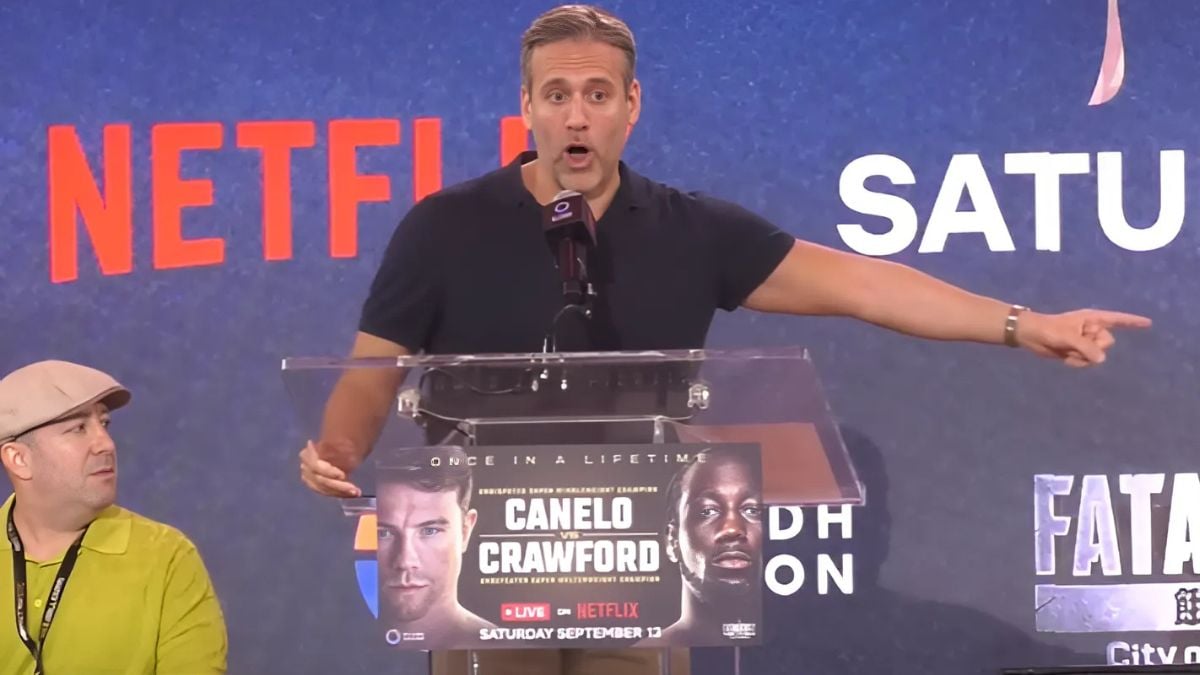Like many around the country, I was there for every second of the Canelo Alvarez and Terence Crawford fight night on Netflix. There’s simply nothing like a big fight night in Las Vegas that harkens back to the glory days of the sport’s past. At 44 years of age, I remember what Tyson vs. Holyfield felt like. I recall the days of Floyd Mayweather’s era dominating national attention. Max Kellerman calling fights alongside Jim Lampley provided the sounds of a generation.
Saturday night’s “fight of the century” was filled with jabs, crosses, and uppercuts. Despite not a single knockdown from any fighter in the bouts broadcast worldwide on Netflix. The broadcast was clean—welcoming in the fight fans of yesterday and today, while ushering in a new age of viewer to the sweet science.
While the night had the feel of the past, the evening also showcased what boxing lacked: attention. The attention that once captured a nation through dynamic personalities was lost in the execution of the evening. Only for the commentators’ narrative to be, “Welcome to the golden age of boxing.” Did I miss the memo, or is this a perfect example of boxing attempting the illusory truth effect?
There’s an old saying. If you say something repeatedly, then over time people will believe it—whether it’s true or not.
Saturday night’s broadcast on Netflix understood that they would have the eyes of the world on this bout. The team of Jon Anik, Andre Ward, and Max Kellerman was outstanding in calling the in-ring action of every fight. The analysis from Skipper Kelp was on point all evening regarding the scorecards. Including the tight windows of opportunity each fighter had to capitalize on the card.
There was even a Michael Buffer sighting. With his classic “Let’s get ready to rumble” line prior to the main event. The evening had it all for fight fans who hadn’t watched the sport for many years.
Don’t Preach To The Audience
Outside the in-ring action, viewers were treated to lectures from Kellerman. Who is regarded by many as one of the most knowledgeable people in the sport. He knows its history, he knows its present. But the future tales of what could be from Kellerman left many shaking their heads.
Kellerman is the one who defends the health of the sport when questioned on its vitality.
Earlier in the week, Kellerman got into a war of words at the pre-fight press conference. He called Dana White, who was the lead promoter for Canelo vs. Crawford, the greatest fight promoter in his lifetime. He then told the crowd that the reason why boxing isn’t as popular anymore is because of what White built with the UFC—before attempting to spin it back to the fight he was promoting, saying White is attempting to do with boxing what he did with the UFC.
Then he was interrupted mid-sentence by Canelo Alvarez defending the sport of boxing as “bigger than big.”
Talk about an uncomfortable situation, created by Kellerman speaking the truth about why boxing is not the sport it once was.
There can be debates about the health of the sport. But the single biggest draw outside of what happened Saturday night has been any fight Jake Paul has been involved with. That should tell you all you need to know about the health of the sport right there.
Spin Doesn’t Mean Attention
Regardless, you could tell Kellerman was trying to save his skin on Saturday night in his commentary regarding the health of the sport following the end of the main event. With tears in his eyes, Kellerman called Terence Crawford the Michael Jordan of his era in the sport.
If five fights in five years makes you the Air Jordan of the sport, what was the top memory of it for the sports audience? I’ll wait for your responses.
Then Kellerman went on to say that the hope of the Canelo vs. Crawford event would be the moment that kicked off a “golden era of boxing.” He credited Saudi promoter Turki Al-Sheikh for having the resources (money) to make events like Canelo vs. Crawford happen.
He then spun it back to Dana White and how he built the UFC into a massive success. Kellerman closed his thoughts by crediting Nick Khan of WWE and the global platform of Netflix for starting a new era in the sport of boxing.
It’s a weird dichotomy for Kellerman to state in one sentence that the UFC has taken the shine off the sport of boxing, only to say days later that Saturday night is the kickoff of the golden age of boxing.
How is that even possible?
The Power of Personality
Boxing is built on the same bedrock that any fight sport is built on: personality. Audiences will only grow if the personalities of the sport cut through the noise of the day-to-day sports media ecosystem.
What made McGregor vs. Mayweather was the personalities presented—a crossroads of the sweet science and the sport that robbed it of its funding. Tyson–Holyfield was built on personality, shock and awe, and immediate interest because of its shocking nature.
That’s why any fight Jake Paul touches turns to gold: personality. Fans desire to not give him credit for anything while wishing he’d be knocked out against a “true fighter.” In the attention economy, you need personality to earn attention. Boxing simply doesn’t have it in Kellerman’s current “golden age.”
What Saturday night lacked in the months of promotion leading up to it was personality. Two focused fighters didn’t grab the attention of the country with the words they said, nor the actions they took. The slew of advertisements and cross-promotion with the UFC and WWE is what drove the attention for the fight, showing how diminished the shine on the sport truly is. If you’re using the larger entities with bigger personalities and attention on their products, what does that tell you of your sport?
Kellerman’s failure on Netflix Saturday night didn’t overshadow his performance on the mic during the bouts. He’s a conductor, crafting his symphony while telling the tale of two men taking risks for the entertainment of us all.
Where Kellerman faulted was in telling the audience it’s sunny outside when it’s been a couple of decades of rain. A clear example of the illusory truth effect—because boxing’s “golden era” lost its light far too long ago, no matter how many times they’ll everything’s fine.
Barrett Media produces daily content on the music, news, and sports media industries. To stay updated, sign up for our newsletters and get the latest information delivered straight to your inbox.

John Mamola is the sports editor and columnist for Barrett Media. He brings over two decades of experience (Chicago, Tampa/St Petersburg) in the broadcast industry with expertise in brand management, sales, promotions, producing, imaging, hosting, talent coaching, talent development, web development, social media strategy and design, video production, creative writing, partnership building, communication/networking with a long track record of growth and success. Honored to be a five-time recognized top 20 program director in a major market via Barrett Media and honored internally multiple times as station/brand of the year (Tampa, FL) and employee of the month (Tampa, FL). Connect with John by email at John@BarrettMedia.com.


